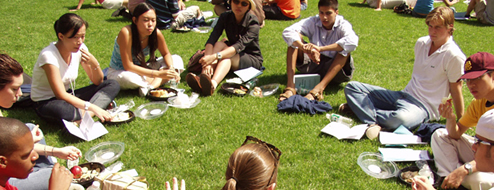Though winter’s chill may make summer seem far away, it is a good idea for students to think about what they want to do over the summer and begin making plans. The temptation, of course, may be to plan to veg out all summer at the beach, but doing something more substantive can give students a leg up on their college applications. This doesn’t mean that there are activities guaranteed to earn students admission at the university of their choice, but rather that students should take the time to pursue more deeply what interests them. More than anything else, colleges want to know what makes students tick, how they think about the world, and why they think colleges can help them pursue those interests. in order to do that, students must first find out themselves. Read on for how and why to do this.
Deepen interests
By exploring their interests when they have more free time over the summer, college-bound high school students can gain a better sense of which of their passions they want to pursue in college. This is helpful for two reasons. First, as students begin to understand what makes them tick, they can better understand which colleges will help them pursue those interests. Second, once they have a better sense of what they are passionate about , students write more interesting and thoughtful essays.
Think about interests and passions
After all, if students have no idea what they find interesting and can’t articulate why they want to go to a particular school, it will be difficult for the college admissions officers who read those essays to figure out what moves applicants and why (or even if) they want to attend their colleges. While there are no hard-and-fast rules for what college admissions want to see, colleges want to see students pursuing their own interests (not what they think will look good on their applications).
Do something different
In addition to the vast business of summer programming for high school students, there are also a number of alternatives, which are often much cheaper and can be just as instructive as costly summer programs. Students can volunteer, take classes, find internships, get jobs or shadow professionals whose careers interest them to get a better sense of fields that excite them. Students may also wish to check out the pre-college programs at universities, but they should do so with the understanding that attending a summer program at a given college is not a ticket to being admitted to the college as an undergraduate.
Other possibilities
Juniors might consider beginning to visit colleges over the summer, too, to begin compiling a list of colleges that they are considering applying to. Summer college visits are different from academic-year visits, especially because campuses tend to empty out over the summer, but they can still be informative and summer is a convenient time for many students to visit college since they have more flexible schedules. For more on summer college visits, see this blog: http://galined.com/archives/summer-college-visits
Reflect to get started on essays early
Finally, students can begin to reflect on possible essay topics. By starting to think about what they want to say in their essays, students can reduce the stress of writing numerous essays; procrastinating and trying to write a perfect essay the night before it is due is a surefire way to feel stressed out. A simple way to start on essays is for students to think hard about their experiences working, volunteering, taking classes, or whatever else they may do over the summer. What was meaningful about them? What did they learn? How did they change? What would they have done differently in retrospect? By thinking about those experiences when they are still fresh in mind, students can capture their excitement and passion for use later in college application essays. for more on starting early on college essays. For more on getting a jump on college essays over the summer, see this blog: http://galined.com/archives/college-essays-start-now
Bottom line
While students have every right to take some time to themselves over the summer for rest, relaxation and fun, they should also make sure that they have productive experiences during the summer. What constitutes a productive summer can take many shapes—getting a job, , taking classes, volunteering, reading widely, or something else—and depends entirely on what a student wants to explore. The important thing is that students get out there and pursue their interests. By exploring their interests from different angles, students will also be better situated to choose colleges that will help them to learn still more about their interests, and they will be better able to explain how a college can help them achieve their goals.




